Top 13 Botify Alternatives & Competitors in 2024
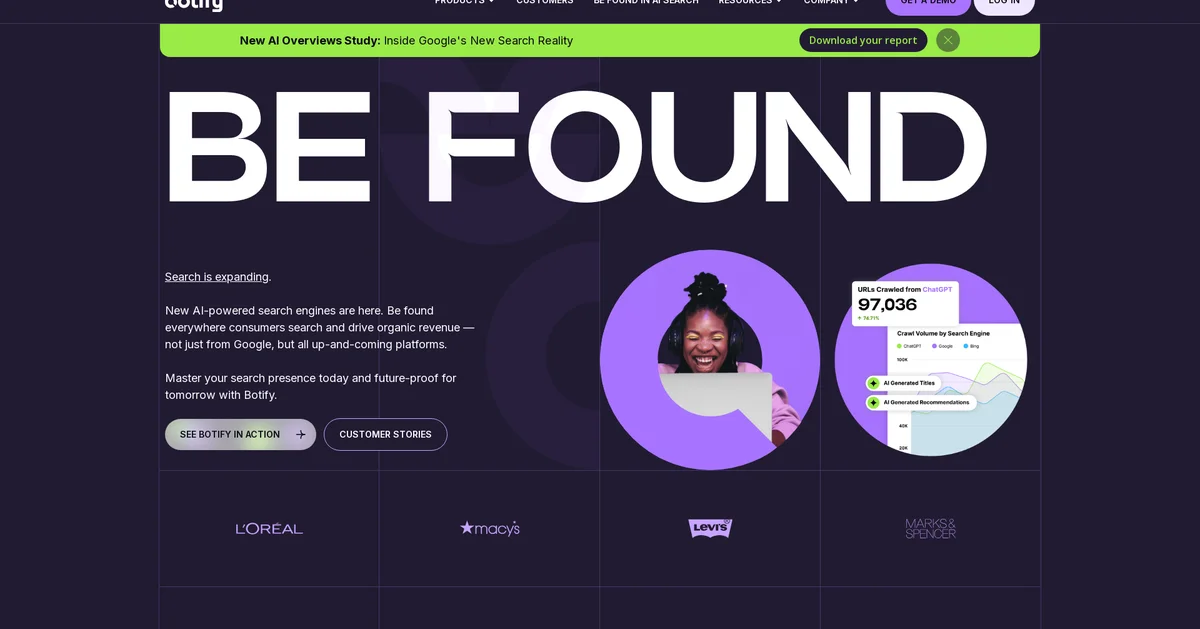
Search optimization platform Botify has become a key player in helping businesses navigate the complex world of AI-powered search. The platform tackles a common pain point for organizations: maintaining strong online visibility as search patterns shift and algorithms grow more sophisticated. Through smart automation and deep analytics, Botify simplifies the process of getting content discovered across search engines and AI platforms. The tool particularly excels at identifying and optimizing revenue-generating pages that might otherwise get buried in search results.
What sets Botify apart is its data-driven approach to improving search performance. The platform provides concrete insights about potential weaknesses and growth opportunities in a company’s digital footprint. This helps protect existing traffic sources while opening new paths for organic revenue growth. By combining proprietary data with competitive analysis, Botify delivers practical search strategies that work in today’s market conditions. The platform continues gaining traction among enterprises looking to strengthen their digital presence, from industry veterans to emerging brands just starting to focus on search optimization.
While Botify is a great product, it’s always good to shop around and look for alternatives. This article identifies some top competitors and their pros and cons.
Conductor
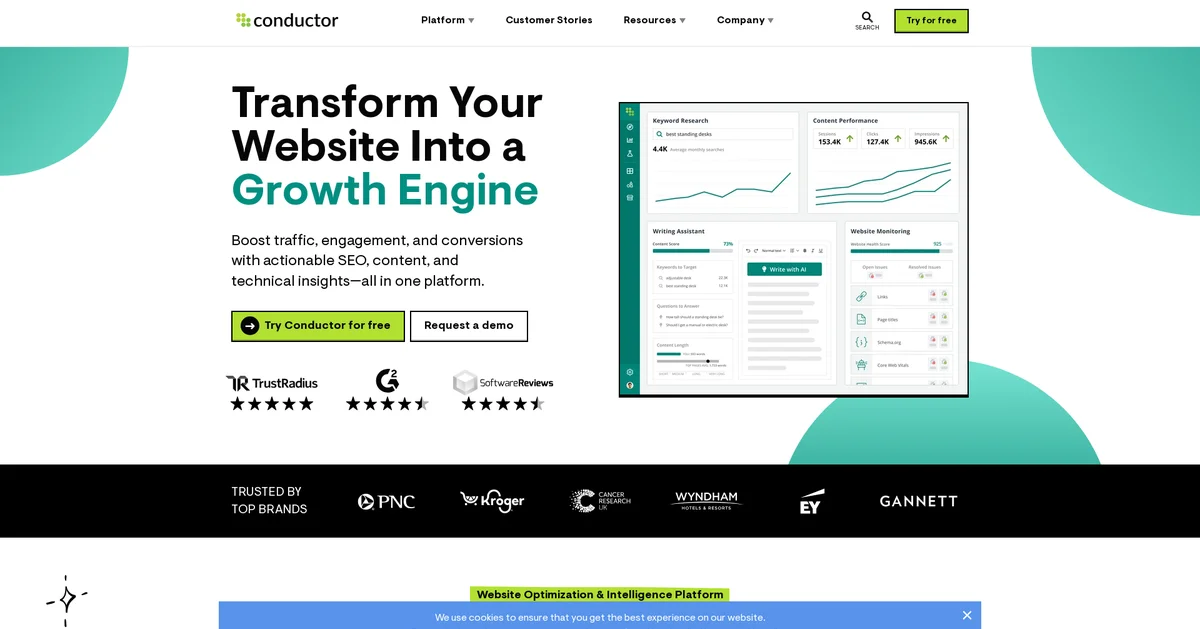
Conductor emerged as a leading enterprise SEO platform by turning complex website data into actionable growth strategies. The platform combines technical SEO capabilities, content optimization tools, and marketing analytics to help teams drive meaningful results. Many enterprise brands have switched from Botify to Conductor for its comprehensive approach to organic search performance.
The platform’s continuous site monitoring capabilities set it apart from competitors. When technical issues or traffic changes occur, teams receive immediate alerts to address problems before they impact revenue. Conductor streamlines workflows between SEO specialists, content teams, and developers through shared workspaces and automated task management. These collaboration features help organizations create high-performing content more efficiently.
Content strategy represents a core strength of the Conductor platform. Teams can analyze search intent data, identify content gaps, and optimize existing pages based on real performance metrics. Major brands like Samsung have used these insights to significantly boost organic traffic and conversions through data-driven content optimization.
Conductor delivers enterprise-grade SEO capabilities through an integrated suite of tools focused on technical optimization, content performance, and cross-team collaboration. The platform’s emphasis on real-time monitoring and actionable insights makes it a compelling alternative to Botify.
Pros
- All-in-one platform combining SEO, content, and technical tools
- Continuous site monitoring with instant alerts
- Built-in collaboration features for marketing teams
- Smart recommendations to improve content impact
- Proactive site health monitoring
Cons
- Initial platform onboarding takes time
- Premium pricing structure
BrightEdge
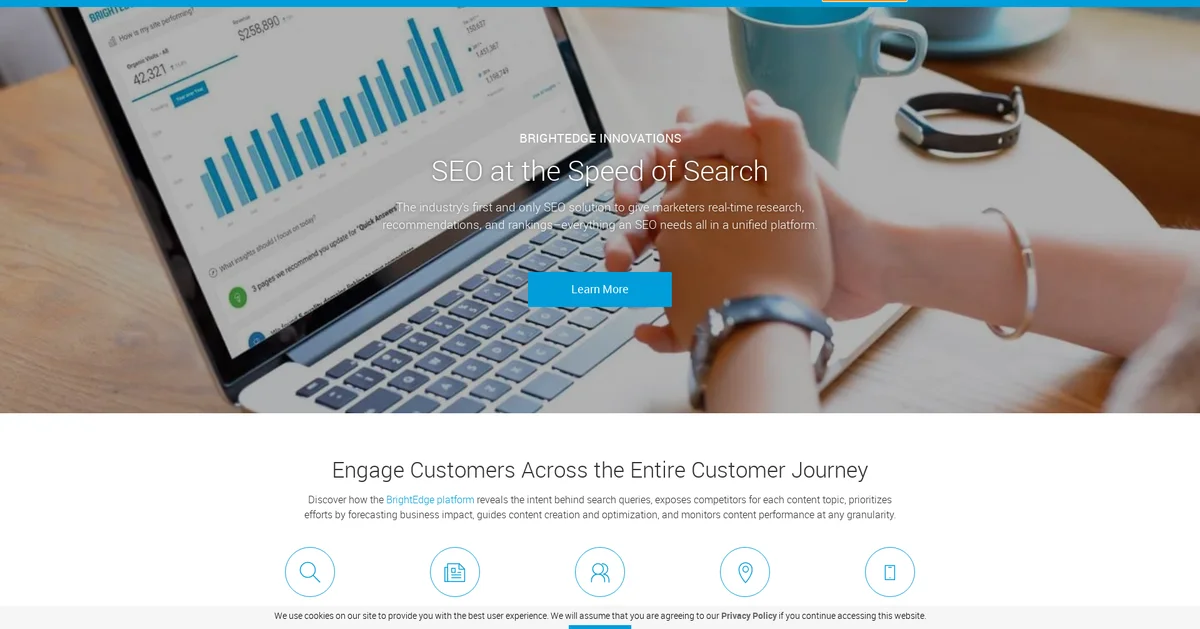
BrightEdge stands out as a leading force in search optimization technology, combining AI capabilities with practical SEO tools that help brands decode and act on search behavior. Since pioneering real-time SEO solutions, the platform has evolved to offer marketers instant access to research, actionable recommendations, and performance metrics in a unified dashboard.
The platform’s core strength lies in decoding customer search intent patterns. This capability enables companies to focus their SEO investments where they’ll generate maximum returns. Beyond intent analysis, BrightEdge monitors competitor activities and performance, giving marketers concrete data to shape strategies that capture market share and deliver measurable business outcomes.
BrightEdge excels at connecting online presence with physical locations. The platform includes robust local SEO functionality for businesses operating brick-and-mortar stores, ensuring strong visibility in target geographic markets. Their social media optimization tools improve campaign performance across major platforms, making it valuable for brands seeking unified marketing approaches.
For organizations serious about search visibility, BrightEdge delivers a complete toolkit that drives SEO success. The platform serves diverse users - from dedicated SEO teams to marketing directors and content strategists - who need to strengthen their digital presence and track results.
Pros
- Dynamic research and recommendation engine
- Deep search intent analysis
- Robust competitor tracking tools
- Strong local SEO capabilities
- Cross-platform social optimization
Cons
- Complex interface for beginners
- Premium pricing structure
seoClarity
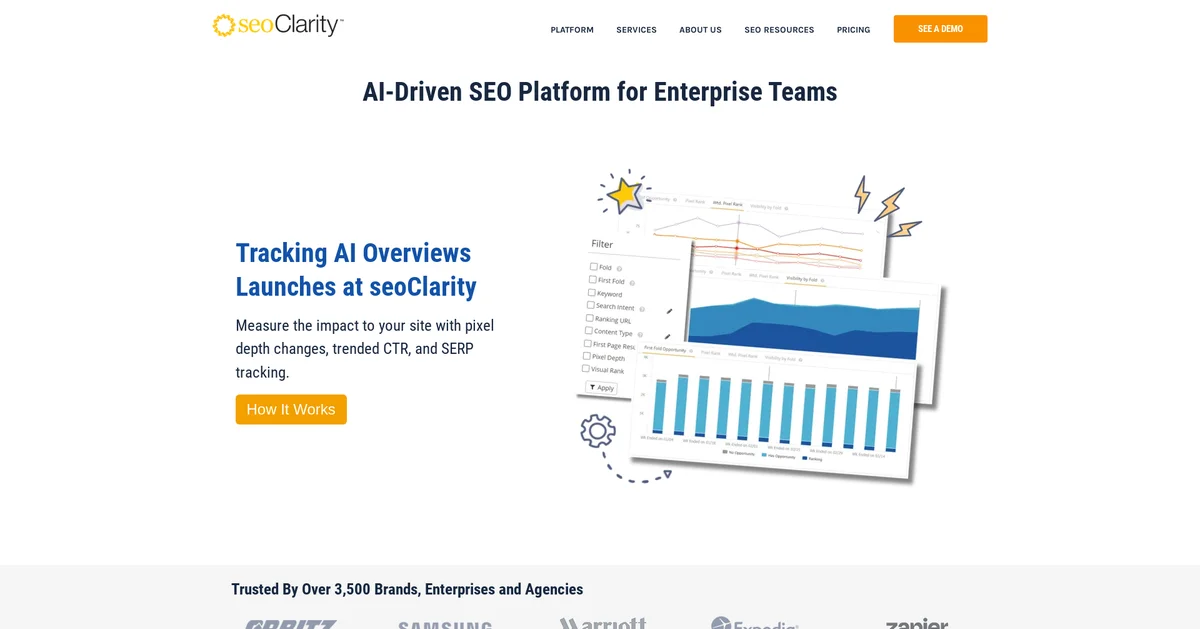
SeoClarity brings enterprise-level SEO capabilities through their AI-powered platform. The software helps teams optimize search performance by monitoring key metrics including pixel depth, CTR, and SERP rankings. Their platform serves over 3,500 organizations ranging from global brands to digital agencies, delivering actionable insights backed by comprehensive data.
The platform stands out for its real-time visibility tracking capabilities. Teams can monitor search performance fluctuations and understand which factors drive site visibility changes. Real results speak to the platform’s effectiveness - one B2B eCommerce client saw organic traffic climb 30% year-over-year after implementing seoClarity’s recommendations and tools.
The company puts significant emphasis on smooth user adoption. Their team works closely with organizations using multiple SEO tools or switching from other platforms to ensure a seamless transition. This hands-on approach means teams can start gathering valuable insights and optimizing strategies without technical headaches.
Client success stories highlight dramatic improvements in both productivity and traffic. Some organizations report 4x gains in team efficiency alongside substantial organic growth, demonstrating how the platform drives both operational and revenue impact.
Pros
- Comprehensive visibility tracking
- User-friendly onboarding for teams
- Proven success with measurable results
- Supports large enterprises and agencies
Cons
- May require a learning curve for new users
- Some features may be more robust than needed for smaller businesses
Searchmetrics
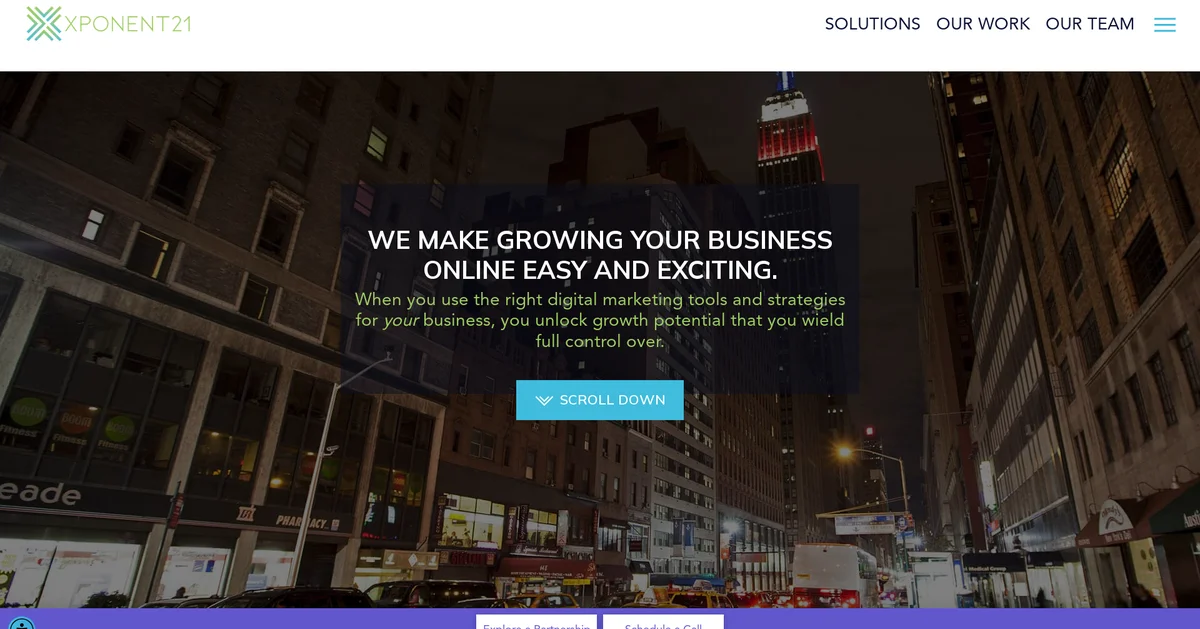
Searchmetrics delivers specialized digital marketing solutions to boost companies’ online visibility and performance. Since its founding, the agency has built a strong track record in website design, SEO strategy, social media campaigns, and marketing analytics. Their approach centers on developing customized strategies that align with each client’s specific market position and growth targets.
The agency stands out through its rigorous use of data analytics to power SEO decisions. By analyzing key performance metrics, they help businesses fine-tune their content and technical optimization for better search rankings and user engagement. Beyond pure metrics, Searchmetrics works with clients to develop authentic brand messaging that connects with target audiences.
Their team brings together specialists from across the digital marketing spectrum, fostering close partnerships with clients throughout project lifecycles. This hands-on collaboration style promotes accountability and allows for quick strategy adjustments based on real-world results.
When comparing search optimization platforms, Searchmetrics offers a strong alternative to Botify by combining strategic insight with practical execution. Their focus on tailored solutions and data-backed recommendations provides organizations with clear pathways to sustainable growth.
Pros
- Flexible solutions adaptable to business requirements
- Data-driven approach to strategy development
- Direct client collaboration throughout projects
- Broad digital marketing capabilities
Cons
- Higher touch engagement model required
- More limited AI automation than Botify platform
DeepCrawl
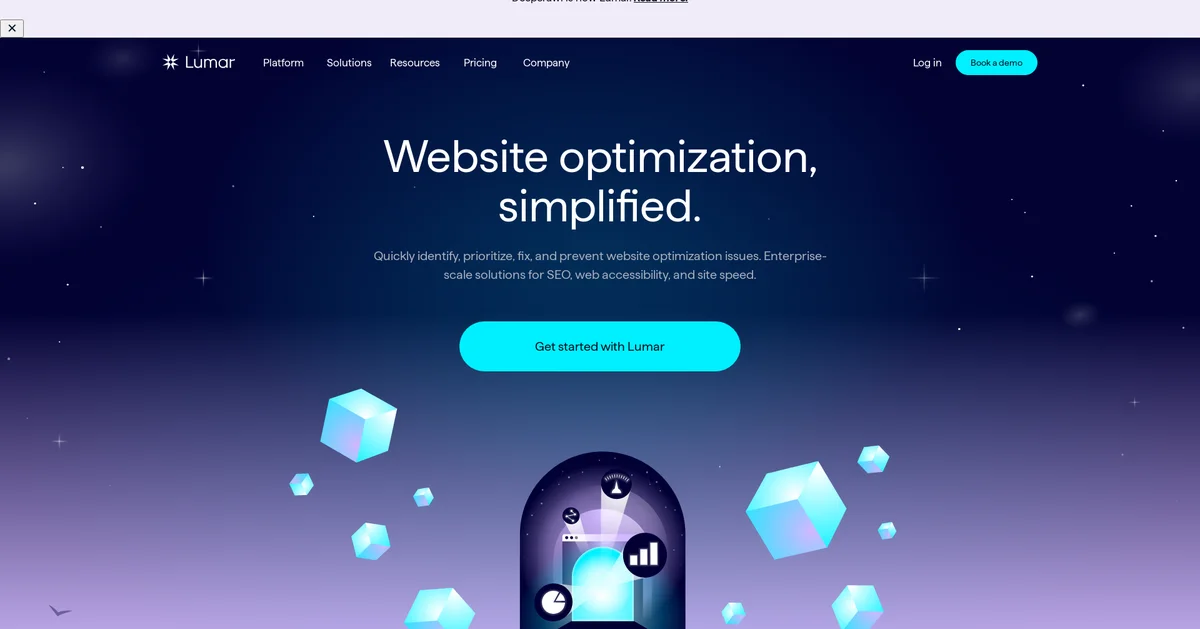
Lumar, previously operating as Deepcrawl, stands as a robust competitor to Botify for enterprise-level search optimization. The platform evolved from its original mission of streamlining website optimization and now tackles technical SEO challenges, performance issues, and accessibility barriers head-on.
Speed and scale distinguish Lumar in the crowded SEO software market. The platform processes 450 URLs every second, delivering substantial data sets that enterprise teams need for quick decision-making. Large organizations particularly benefit from this rapid analysis, paired with clear data visualization that makes complex technical information digestible for various team members and executives.
The platform takes a hands-on stance toward problem-solving. Its AI technology generates specific ticket content, helping development teams tackle issues in order of impact. Rather than just pointing out problems, Lumar provides concrete steps for resolution. Teams can monitor fixes, implement solutions, and set up guardrails against future issues - especially valuable given today’s rapid technical evolution.
Accessibility testing sets Lumar apart through robust WCAG compliance checking. Organizations focused on digital inclusion find practical value in these features. The system spots potential barriers and provides specific steps to remove them, making accessibility improvements straightforward.
Compared to similar enterprise SEO platforms, Lumar differentiates through its combination of processing power, practical guidance, and comprehensive approach spanning technical SEO, performance, and accessibility needs.
Pros
- High-speed crawling engine
- Clear data visualization tools
- Smart issue prioritization
- Built-in accessibility testing
- Preventive maintenance features
Cons
- Initial platform complexity
- Enterprise-level pricing structure
MarketMuse
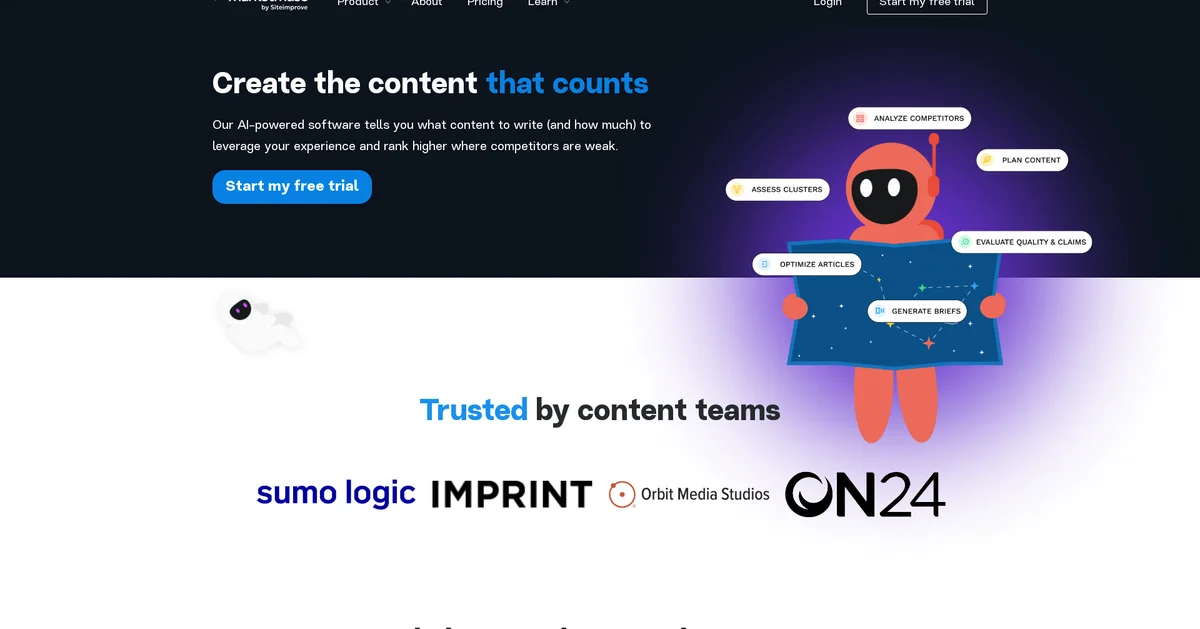
MarketMuse stands out among content optimization tools by taking a more sophisticated approach to content strategy. Rather than simply suggesting keywords, it analyzes content performance across entire websites to spot gaps and untapped opportunities. The platform reveals weak spots in competitor coverage, giving content teams a strategic advantage in their market space.
The platform’s AI technology scans through website content to highlight areas needing additional coverage or improvement. Content teams can leverage these insights to develop more comprehensive, authoritative content that connects with readers. The tool helps determine both content direction and the optimal volume needed to establish domain expertise.
What sets MarketMuse apart is its deep focus on content quality and structure. The platform provides specific guidance for improving content depth and thoroughness, helping pieces cut through the noise online. Features like internal linking suggestions and content scoring create a more cohesive experience for readers while maintaining strong editorial quality.
MarketMuse emerged from a practical need to streamline content development workflows. The company aims to reshape how organizations approach content marketing by helping them leverage their existing knowledge base more effectively.
MarketMuse serves as a robust alternative to Botify, with particular strengths in comprehensive content analysis and practical optimization guidance.
Pros
- Deep analysis of existing website content
- Reveals gaps in market coverage
- Strong focus on content quality
- Clear, actionable optimization steps
Cons
- Initial platform learning takes time
- Premium pricing may challenge smaller teams
SEMrush
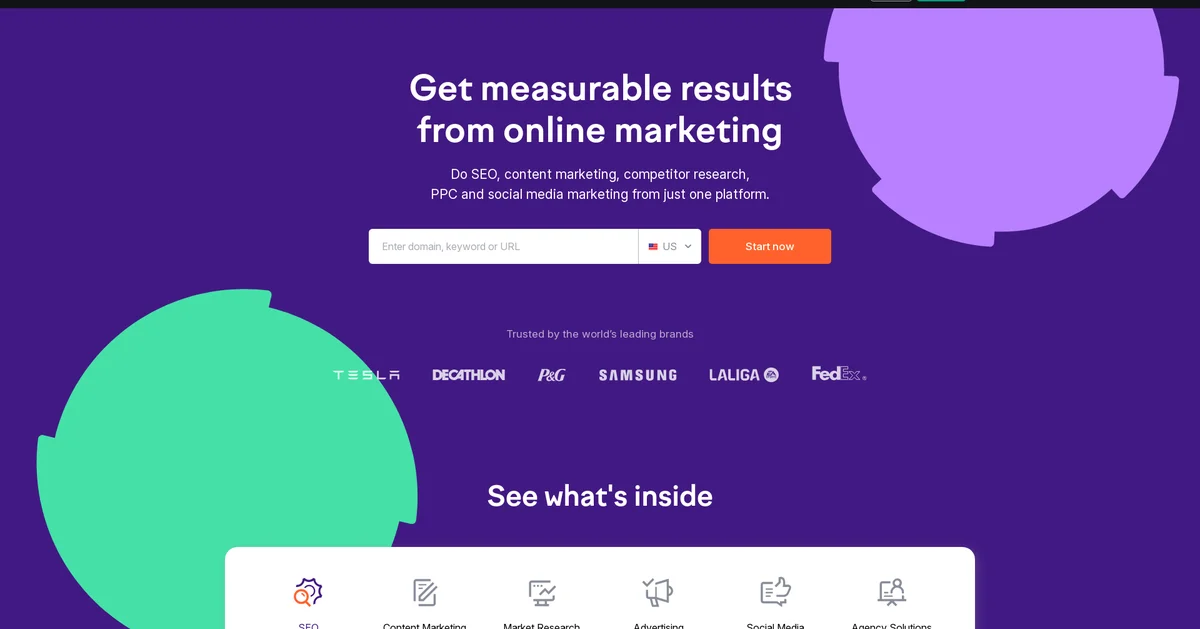
SEMrush combines essential digital marketing tools into a single platform, bringing together everything from SEO analysis to social media tracking. Major companies rely on its diverse toolkit to boost their digital footprint and measure marketing performance. The platform works well for both seasoned pros and newcomers, with straightforward controls that make data-driven marketing accessible.
The keyword research capabilities set SEMrush apart, giving marketers access to keyword data spanning 130 countries and billions of search terms. Companies use these insights to fine-tune their content strategy and capture more organic traffic. The platform runs thorough technical website checks that spot issues affecting both search rankings and visitor experience.
Looking at competitor performance becomes straightforward with SEMrush’s analysis tools. Marketing teams can examine traffic patterns, promotional strategies, and untapped opportunities their rivals might have missed. This detailed competitive intelligence helps brands identify promising keyword targets and link-building prospects.
Marketing agencies benefit from SEMrush’s white-label reporting and workflow features that make client work more efficient. Teams can handle multiple accounts and campaigns while maintaining consistent reporting and communication, reducing the administrative burden of agency operations.
Pros
- Comprehensive tools covering SEO, PPC, and social media
- Extensive keyword database with global reach
- User-friendly interface that requires minimal expertise
- In-depth competitor analysis capabilities
- Strong agency solutions for client management
Cons
- Can be overwhelming for beginners due to its vast features
- Pricing may be a consideration for smaller businesses
- Some users report a learning curve with advanced features
Moz
Moz stands as a cornerstone in the SEO world, with tools that boost search rankings and attract valuable traffic. Their approach differs from Botify’s AI-heavy technical focus by delivering broader SEO capabilities that work for various business needs.
The flagship Moz Pro package brings essential SEO tools under one roof. From digging into keyword opportunities to running thorough site checkups, teams can monitor rankings, scope out competitor moves, and extract meaningful keyword data. This broad functionality serves businesses seeking solid SEO tools without the complexity of deep AI systems.
The STAT platform handles rank tracking at scale, delivering daily performance metrics across multiple domains. Agencies juggling many client accounts and enterprises with complex web properties particularly benefit from these capabilities. For brick-and-mortar businesses, Moz Local streamlines location-based SEO and review management in a central dashboard.
Starting as a community platform back in 2004, Moz has grown alongside the evolution of search marketing. Their open approach to sharing knowledge through active forums and educational content has built a loyal following of marketers who appreciate evidence-based SEO strategies.
Pros
- Full-featured SEO toolkit covering key needs
- Robust educational resources and community support
- Handles both local and international SEO requirements
- Adaptable reporting and API integration options
Cons
- Less emphasis on AI capabilities compared to Botify
- Feature depth can be daunting for SEO beginners
Ahrefs
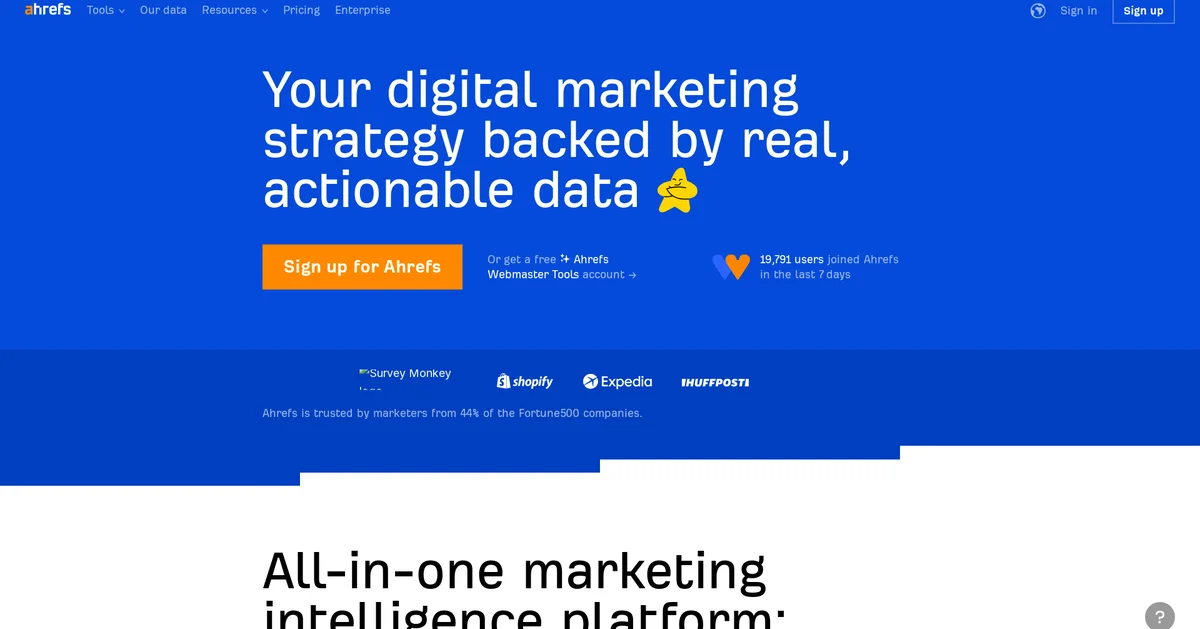
Ahrefs stands among the most comprehensive marketing intelligence tools available today. Since 2011, this platform has grown from a basic SEO toolkit into a powerhouse used by major corporations, including nearly half of Fortune 500 companies. The platform combines multiple SEO functions under one roof, with their Site Explorer tool proving particularly valuable for analyzing competitor traffic sources and strategic insights.
Their Keywords Explorer deserves special mention for its depth and accuracy in search analysis and content optimization guidance. The platform rounds out its core offerings with a thorough Site Audit function for technical SEO work and Content Explorer for backlink and mention tracking. Recent additions include smart AI-powered tools for content evaluation and enhancement, bringing fresh capabilities to their already robust feature set.
Behind the interface lies over ten years of web crawling data, creating one of the most substantial databases in the SEO industry. By developing their own search engine and maintaining this vast data repository, Ahrefs spots patterns and opportunities other platforms might overlook. The company backs up its technical strengths with practical education, offering detailed guides and training materials that change complex SEO concepts into actionable steps.
Pros
- Full-featured SEO toolkit with integrated workflows
- Rich historical data for deep competitive research
- Strong educational resources and user community
- Results-focused approach with clear metrics
Cons
- Steep initial learning curve
- Premium pricing structure
- Complex features require time investment
OnCrawl
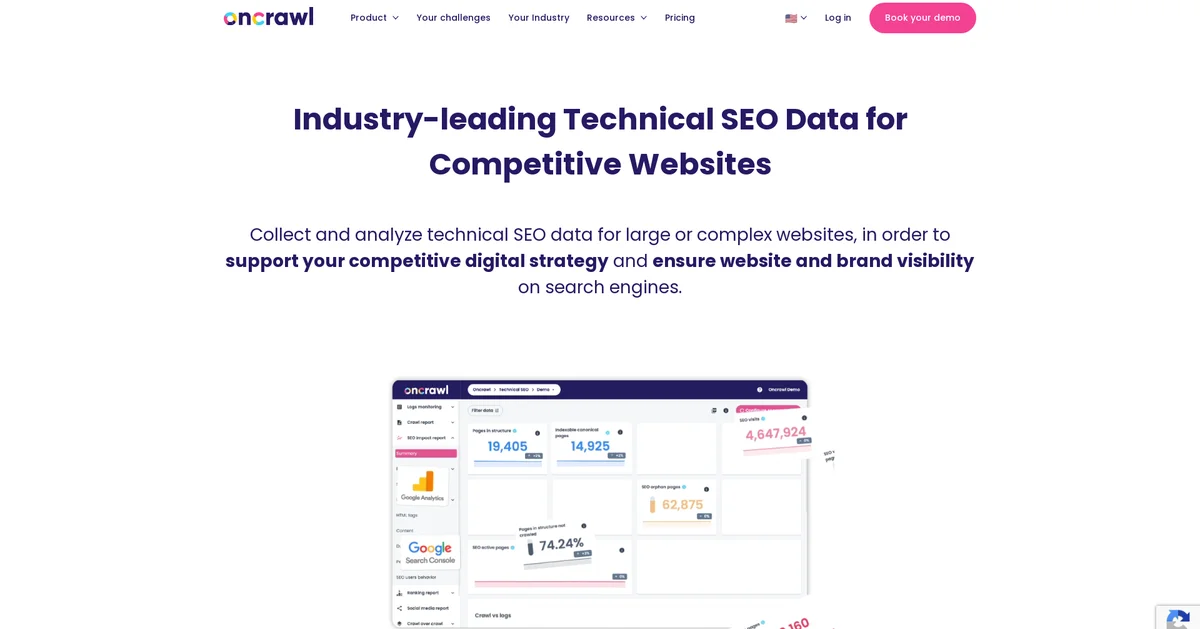
OnCrawl stands among the top technical SEO platforms, delivering data-driven insights for website optimization. The platform specializes in handling large-scale websites and complex digital infrastructures, making it particularly valuable for enterprises tackling sophisticated SEO challenges. Their approach combines deep crawling capabilities with advanced analytics to help maintain search visibility.
The platform’s core strength lies in its analytical depth. Teams can perform cross-analysis of multiple SEO factors, revealing connections that might otherwise go unnoticed. A sophisticated segmentation engine breaks down complex data sets into actionable chunks, streamlining the process of identifying both problems and opportunities. The permanent data storage feature proves especially valuable, letting teams track performance trends and measure the impact of SEO changes over time.
OnCrawl emerged from a practical need to simplify technical SEO for enterprise-level websites. Their focus on larger, more complex sites has shaped both their feature set and support structure. The platform balances sophisticated capabilities with accessible interfaces, while their support team brings substantial expertise in handling enterprise-scale SEO challenges.
When stacked against Botify, OnCrawl distinguishes itself through its emphasis on detailed analysis and practical implementation. The platform particularly suits organizations needing granular data insights without getting bogged down in unnecessary complexity.
Pros
- Comprehensive data analysis capabilities
- Advanced segmentation tools
- Complete historical data access
- Intuitive platform design
- Robust support for enterprise websites
Cons
- Initial learning period required
- Premium pricing structure
- Less established than some competitors
Screaming Frog
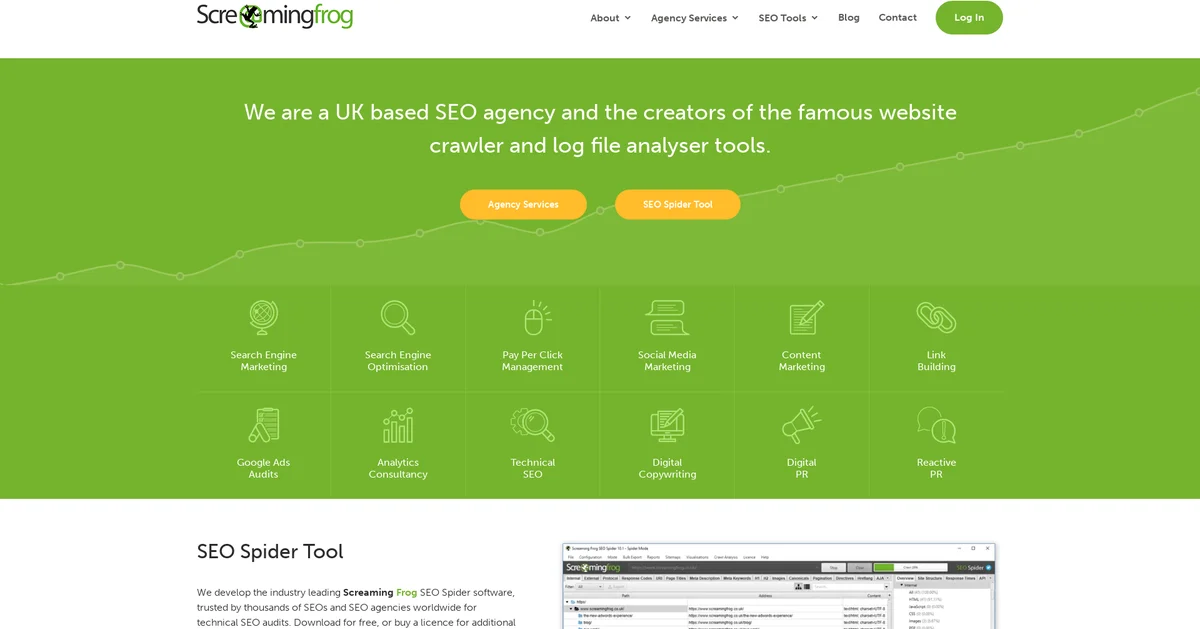
From its humble beginnings as a UK digital agency, Screaming Frog has evolved into a powerhouse creator of essential SEO tools. The Screaming Frog SEO Spider stands out for delivering straightforward, reliable technical SEO audits. While competitors like Botify emphasize AI-driven analysis, Screaming Frog takes a more direct approach, giving users clear insights into broken links, duplicate content, and performance issues. Small website teams and hands-on SEO professionals often gravitate toward its streamlined functionality.
A standout advantage of Screaming Frog comes from its offline capabilities, enabling local file crawls and secure website analysis without internet connectivity. The software runs smoothly across Windows, Mac, and Linux platforms, adapting to various work environments. Their practical approach combines proven SEO methods with innovative solutions, making the tool valuable for both established brands and growing businesses - a different market focus than Botify’s enterprise-centric model.
The company maintains strong relationships with users through comprehensive documentation, tutorial resources, and active community engagement. These support channels help newcomers quickly master the platform’s capabilities and make the most of its features.
Pros
- Clean, intuitive interface
- Works offline for local crawls
- Responsive support team and active user community
- Adaptable for various business sizes
Cons
- Basic AI capabilities compared to Botify
- Performance limitations with larger websites
- Focuses solely on technical SEO without marketing features
Ryte
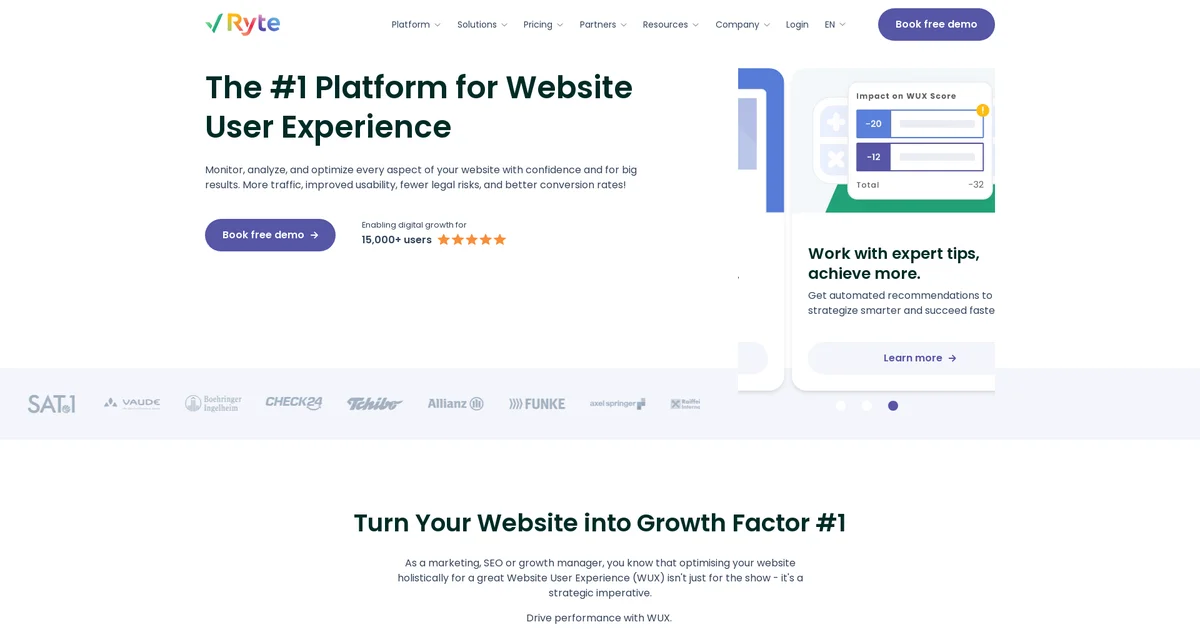
Ryte stands among the top platforms for website user experience (WUX) and search engine optimization. Their track record speaks for itself - serving over 15,000 users by delivering actionable data insights and clear performance metrics. The platform goes beyond basic SEO tactics to tackle the full spectrum of user satisfaction, recognizing that truly optimized sites naturally attract more visitors and drive better results.
The platform’s automated recommendation engine sets it apart by pinpointing and resolving performance bottlenecks. Real-world results show session duration improvements reaching 40% through targeted fixes for user experience, page speed, and content quality. Ryte also breaks new ground with built-in sustainability features that help websites reduce their carbon impact while maintaining peak performance - addressing growing environmental concerns in the tech sector.
Website optimization through Ryte takes a comprehensive view across quality assurance, accessibility standards, and content operations. These core pillars work together to improve how visitors interact with every aspect of a site. Built-in GDPR compliance tools give businesses confidence their optimization efforts meet current privacy requirements.
The results speak volumes about Ryte’s approach to organic growth through careful website optimization. Take Personio for example - they achieved substantial gains in organic traffic and search rankings after implementing Ryte’s recommendations in their competitive market space.
Pros
- Smart automated performance recommendations
- Deep user experience and engagement metrics
- Built-in sustainability and compliance tools
- Robust content management capabilities
- Multi-faceted optimization framework
Cons
- Technical SEO features less extensive than specialist tools
- Steeper learning curve for WUX beginners
- Premium pricing may challenge smaller organizations
WebCEO
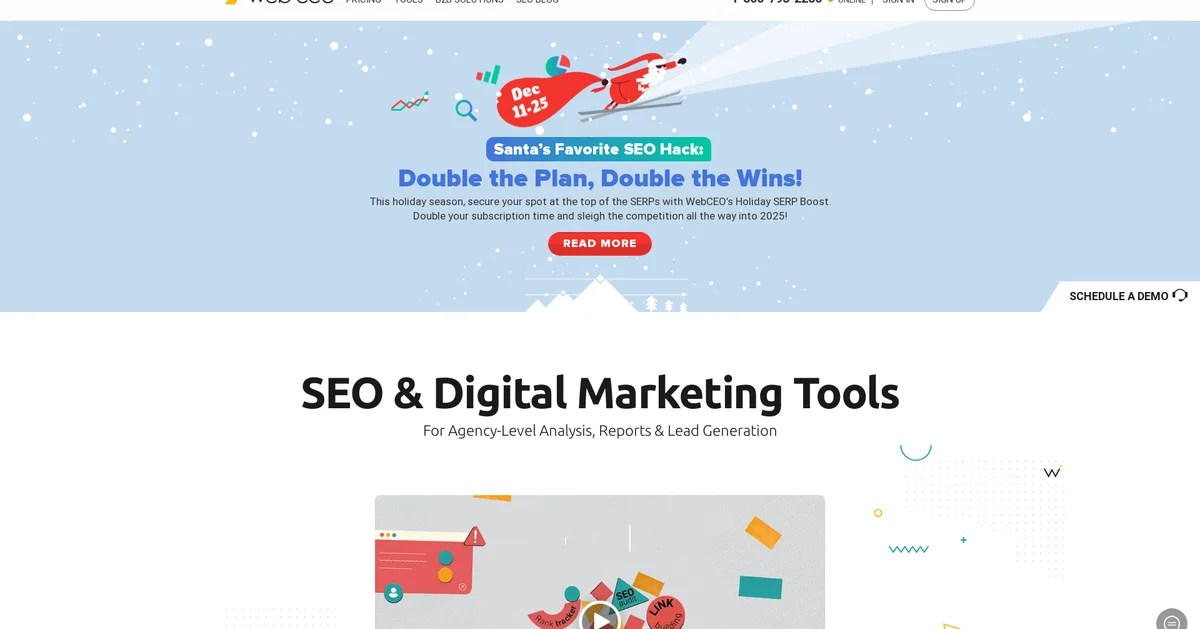
WebCEO delivers robust digital marketing capabilities built with agencies and SEO teams in mind. The platform combines 23 specialized SEO tools under one roof, from keyword analysis to rank tracking and link monitoring. Many agencies appreciate the straightforward interface that makes handling multiple client accounts manageable without sacrificing depth of features.
The platform shines brightest in its project coordination features. Team leads can assign tasks while maintaining tight security controls, and the built-in Task Manager breaks down SEO projects into clear, actionable steps. Adding to its agency-friendly approach, WebCEO includes a smart lead generation widget that helps bring in new business through website integration.
Custom reporting remains a major draw for agencies using WebCEO. The white-label capabilities let teams generate polished, branded reports that showcase their expertise. These reports translate complex SEO data into clear recommendations clients can understand, helping maintain strong working relationships.
WebCEO’s flexible payment structure adapts well to different agency sizes and needs. Strong customer support and competitive pricing make it stack up favorably against alternatives like Botify. The focus on agency workflows, paired with comprehensive tool selection and client-ready reporting, creates a solid foundation for teams seeking an integrated SEO platform.
Pros
- Complete toolkit spanning 23 SEO functions
- Smart project management capabilities
- Professional white-label reporting options
- Adaptable pricing structure
- Responsive support team
Cons
- Initial platform familiarity takes time
- Premium competitor tools offer more advanced features